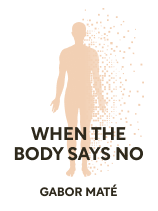

This article is an excerpt from the Shortform book guide to "When the Body Says No" by Gabor Maté. Shortform has the world's best summaries and analyses of books you should be reading.
Like this article? Sign up for a free trial here .
Why is emotional competence so important? How can emotional competence help mitigate the effects of stress?
According to Dr. Gabor Maté, the author of When the Body Says No, chronic stress can lead to a number of physical ailments. It has even been linked to cancer. He explains that developing emotional competence is the key to counteracting the negative effects of chronic stress on the body.
Here’s how to develop emotional competence to keep your mind and body healthy.
1. Avoid Toxic Positivity
The first piece of advice Maté offers for developing emotional competence and counteracting the effects of chronic stress on our bodies is to reject the common overemphasis on “positive thinking.” He says this approach to dealing with negative emotions only makes people repress them. Maté says healthy thinking includes acknowledging all of our genuine feelings. Focusing on only the positive and denying the negative is a defense mechanism developed by those who are hurt. But it doesn’t fix it.
In his suggestion to embrace “the power of negative thinking,” Maté doesn’t mean to dwell; he means be willing to look at what’s wrong. Pay attention to the “negative” signals your body is giving you. Have the courage to ask, “What is my body saying no to?” instead of deploying your coping mechanism to avoid the pain. Maté says that when you avoid what’s “wrong” and focus only on what’s “right,” you’re being controlled by others. You’re not an autonomous being when you live to please others, when you’re acting out a role based on expectations, and when you never say “no.”
To be clear, Maté affirms that genuine positive feelings do contribute to health—love, joy, and happiness increase our well-being. The problem is the insincere positive feelings people use to cover up negative feelings.
| Positive Psychology and Toxic Positivity Maté’s use of the phrase “the power of negative thinking” is likely a reference to the classic self-help book The Power of Positive Thinking. While this book does have some helpful suggestions for calming down your negative reactions to situations, it puts a heavy emphasis on ridding yourself of negative emotions by “deciding” to be happy. This could be considered an unhealthy denial of negative emotions. “Toxic positivity” is the overemphasis on a positive attitude to the point where it invalidates any negative emotion. While the field of positive psychology is centered on approaches to mental health involving an emphasis on cultivating optimism, psychologists in the field make a clear distinction between that and a “toxic” approach. Positive psychology encourages finding contentment through exploring what makes you feel fulfilled in life, while a “toxic” approach to positivity involves encouraging and offering positivity in any and all situations; including situations in which it’s insincere and unhelpful. Positive psychologists say offering positivity in inappropriate situations devalues others’ emotions, and shows a lack of empathy. To generate genuine positive feelings, try some of the following techniques suggested by positive psychologists: – Practice gratitude: Try writing in a gratitude journal daily, or expressing gratitude to others around you each day. – Do random acts of kindness: Psychology research shows that doing kind things for others gives you a boost of happiness. – Write a happy life story for yourself: Envision the future you would like and actually write it out, envisioning it as if it were true. – Practice mindfulness: Self-love and mindfulness meditation has been shown to increase confidence, self-esteem, and contentment. |
2. Listen to Your Body
Becoming aware of all of your true feelings means learning to trust your gut and recognize the signs of stress in your body. Maté says that you should start tuning in more consciously to what your body is telling you. Some signals of underlying stress include: rapid heartbeat, frequent urination, excessive sweating, digestive issues, and unexplained pain such as frequent back pain or headaches. He also says to watch for emotional and behavioral signals, such as: depression, anxiety, hypervigilance, hypersensitivity, over-reactivity, and impulsivity. If you recognize these signs, see them as messages from your body, meant to make you aware of an underlying issue.
(Shortform note: According to The Body Keeps the Score, yoga can help you get in tune with your body’s signals and strengthen areas of the brain that help you stay calm. By focusing on the breath and body, and slowing down into a contemplative practice, yoga can help you attune to the messages your body might be sending you. Not only do you become more consciously aware of the physical sensations in your body, you can become more aware of the emotions that are associated with them.)
Maté encourages you to get in touch with your repressed anger and explore what it means. Anger is toward something—some perceived threat. Identify what that is, and then allow yourself to feel the anger, to sit with it, and contemplate it until it dissipates, and/or you can get help with it through therapy. (Shortform note: If you need help processing feelings of anger, the Headspace app offers anger meditations and a 10-day “transforming anger” program.)
3. Be Your Authentic Self
Maté emphasizes authentic living. Reflect honestly on the relationships in your life. Take off the “rose colored glasses” and ask where your own needs haven’t been met, where you’ve put aside your needs for others, or suppressed your feelings and felt unsupported and unseen. Do so with compassion, recognizing that others are just acting from their own conditioning. Refrain from blame. What matters, Maté says, is your responsibility for yourself to change things going forward. So, he suggests you ask yourself whether you’ve lived your life according to who you truly are, or if you’re trying to live up to others’ expectations.
| Find Your Worth In The Gifts of Imperfection, Brené Brown offers advice for accepting yourself for exactly who you are, rather than trying to please others by being someone else. She says this involves finding your sense of worthiness, by: – Accepting yourself unconditionally, exactly as you are, flaws and all – Rejecting the idea that you need to fit into any societal standards – Recognizing that your self-worth is not dependent on others’ approval. It’s in who you are, not what you do. – Believing that you deserve love and acceptance – Tackling your feelings of shame, as those are antithetical to self-worth |
Maté says to watch for guilt—guilt is often a sign that you’re doing something for yourself instead of others. If you recognize this, learn to embrace the guilt and use it as a signal that you’re actually doing something right. If saying “no” to something makes you feel guilty, but saying yes causes resentment, Maté says you should always choose the guilt. The resentment will be much more damaging.
(Shortform note: If you feel guilty about setting boundaries, it’s possible what you’re really feeling is discomfort because it’s not something you’re used to doing. To accustom yourself to setting boundaries, begin by setting ones that only you have to honor, such as restricting your access to social media or junk food. Starting with saying “no” to yourself will ease you into being able to set boundaries and stick to them.)
4. Connect With Others
Maté says we all need to develop healthy support networks. Copious research shows that lonely, disconnected people are at greater risk for illness, while social support alleviates stress and decreases risk of disease. So seek out stronger social support networks. Reach out and make connections. Especially if you’re suffering, find others to connect and form emotional attachments with.
| Lost Connections In Lost Connections Johann Hari takes a deep dive into the social causes of anxiety and depression. He argues that the lack of meaningful connections due to lifestyles in modern society are major drivers of mental health disorders, and therefore, our medical model of psychiatric care is insufficient for treating the problem at its root. His solutions mostly focus on large-scale systemic social changes, but he also suggests that on an individual level, it’s important to recognize that making online connections isn’t enough. Modern humans tend to think we’re more connected than ever because of our online networks and constant interactions, but despite this, levels of anxiety and depression and loneliness are higher than ever. This clearly indicates that we need to actually get out and talk to people, face to face, as our evolutionary urge to be in connection with others depends on that physical presence. |
5. Tend to Your Spirit
Finally, Maté offers advice for tending to not just your mind and body but your spirit. He says this means connecting with something beyond yourself, and he suggests two major avenues for this:
- Your creative impulse: Maté emphasizes that everyone has some sort of creative urge; this doesn’t just refer to art. It could be any way in which you express yourself—for example, through writing, dancing, gardening, cooking, or building. Whatever your avenue of expression is, Maté urges you to explore it and incorporate more of it into your life.
- Your connection with the universe: Whatever this means for you personally, Maté suggests that you try to connect with something greater than yourself. For some people this is religion, or God, while for others it may be connecting with nature, practicing meditation, studying astronomy, or anything else that makes you feel like you’re part of a greater whole.
A truly holistic approach to health, Maté says, must involve all three dimensions of the whole person: body, mind, and spirit.
| Spirituality Is for Everyone If you’re not a religious or spiritual person, that doesn’t mean you have no way of tapping into something beyond yourself. Spirituality can be understood as cultivating a sense of “awe” for the world around you, which can be practiced by simply observing and connecting with nature. Science writer Chet Raymo, in his book When God is Gone, Everything is Holy, describes his religious naturalist approach to the world. He claims that when you abandon a supernatural explanation for the natural world, it becomes even more awe-inspiring. If you don’t have a spiritual belief system or practice, try connecting with nature and contemplating the interconnectedness of it, to feel yourself as part of a larger whole. |

———End of Preview———
Like what you just read? Read the rest of the world's best book summary and analysis of Gabor Maté's "When the Body Says No" at Shortform .
Here's what you'll find in our full When the Body Says No summary :
- How stress can manifest as chronic illness
- How to heal from and avoid stress-related diseases
- Why toxic positivity can make you sick






